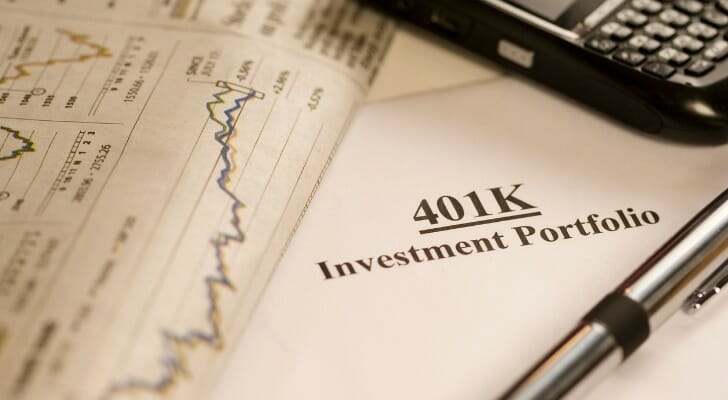What to Do With My 401k Right Now

Market volatility is inevitable. Corrections typically happen every few years when stocks pass up 10% or more from their most recent height. These can even last several months at a time. Stock market crashes, on the other hand, are less common than corrections, but are more abrupt and severe. Wait no further than the 2008 financial crisis or the 2020 crash ushered in by the coronavirus pandemic. More market uncertainty has reared its head in 2022. Simply preparing for market volatility ahead of time is possible. A fiscal advisor can help yous protect your retirement savings from market place volatility.
Protecting Your 401(k) From a Stock Market Crash
Whatever fourth dimension you put your money in the stock market or other investments, you e'er run the risk of losses. While you can brand largely educated decisions, things don't always get to plan. Also, considering you're talking about something as important as your retirement, emotional decision-making can come into play.
Despite the above, at that place are many strategies, uncomplicated and circuitous, you can utilise to mitigate risk. For example, spreading your assets across multiple types of investments and areas of the market can allow you to avert the volatility that comes with stock-picking and full-bodied investment positions.
Everyone has short-term expenses that periodically ascend. For case, you might need to repair your car, replace a broken household appliance or pay for a medical process. Long-term expenses are fifty-fifty more prevalent, including student loans and mortgages. However, the best thing you can do is care for your retirement savings simply every bit importantly equally all of your other needs. This volition ensure your pool of retirement funds will keep to abound over time.
Beneath are some of the most influential strategies you lot tin can use to minimize losses in your portfolio, fifty-fifty if a stock market crash comes around. Just remember that yous can never eliminate risk entirely, though.
Diversification and Asset Allocation
Finding the right asset allocation is crucial to protecting your 401(k) from a stock market crash, while also maximizing returns. As an investor, yous sympathize that stocks are inherently risky, and every bit a outcome, offering higher rewards than other assets. Bonds, on the other hand, are safer investments but normally produce bottom returns.
Having a diversified 401(k) of mutual funds that invest in stocks, bonds and even cash can help protect your retirement savings in the consequence of an economic downturn. How much you choose to allocate to different investments depends in part on how close you are to retirement. The farther you are from retiring, the more time you lot accept to recover from market downturns and full-fledged crashes.
Therefore, workers in their 20s would likely want a portfolio more heavily weighted in stocks. While other coworkers nearing retirement age would probably accept a more even distribution between lower-risk stocks and bonds to limit exposure to a market driblet.
But how much of your portfolio should exist invested in stocks vs. bonds? A general rule of thumb is to decrease your age from 110. The result is the percentage of your retirement portfolio that should be invested in stocks. Investors who are more hazard-tolerant can subtract their age from 120, while those who are more risk-averse tin can do the same from 100.
However, the above rule of thumb is adequately basic and limiting, as it doesn't allow you to account for any of the specifics of your personal state of affairs. A more than comprehensive arroyo would be to build an nugget allocation that includes your goals, risk tolerance, fourth dimension horizon and more. While you tin technically create your own portfolio allocation program, financial advisors typically specialize in it.
Rebalancing Your Portfolio

Rebalancing your portfolio, or changing how much you accept in dissimilar assets, is another vital component of protecting retirement savings from crashes. The idea is that over time, some investments may fare better than others, irresolute the percentage of money in each asset and potentially exposing you to more risk. By rebalancing, you bring the pct of coin invested in stocks and bonds back in line with your original investing target from the department above.
The easiest style to ensure your 401(thousand) is continually rebalanced is to invest in a target-date fund, a collection of investments designed to mature at a certain fourth dimension. Target-date funds automatically rebalance their investments, moving to safer avails every bit the target appointment approaches.
But if you pick your own 401(thousand) investments , you'll want to rebalance your portfolio at least once a year. Some fiscal advisors may recommend rebalancing as often as in one case a quarter. You can exercise this by selling off positions with gains that have tipped your portfolio out of balance. This is especially of import for investors who are nearing retirement. It'south also worth noting that rebalancing isn't the aforementioned as withdrawing money. These transactions are happening within your 401(1000) and won't immediately outcome in taxes.
Try to Have Cash on Paw
Some financial professionals recommend retirees have enough cash or cash equivalents to encompass three to five years worth of living expenses. Having cash reserves tin help pay for unexpected expenditures that a fixed income may not otherwise be able to encompass.
Greenbacks on hand can also mitigate what's called "sequence of returns risk." That's the potential danger of withdrawing coin early in retirement during market downturns and, thus, permanently diminishing the longevity of a retirement portfolio. By selling low, the longevity of the investor's portfolio is jeopardized. Notwithstanding, with cash reserves retirees can withdraw less coin from their 401(chiliad) during a market place decline and use the cash to encompass living expenses.
Go on Contributing to Your 401(k) and Other Retirement Accounts
Steadily contributing to your 401(yard) is another way to protect information technology from future market volatility. Cutting back on your contributions during a downturn may cost you the opportunity to invest in assets at discount prices. Meanwhile, maintaining your 401(k) contributions during a period of growth when your investments have exceeded expectations is equally of import. The temptation to scale back your contributions may creep in. Nonetheless, staying the class can eternalize your retirement savings and help you weather future volatility.
Don't Panic and Withdraw Your Money Early

Surrendering to the fear and panic that a market crash elicits can cost y'all. Withdrawing money early on from a 401(g) tin result in hefty IRS tax penalties, which won't do you any favors in the long run. It's especially important for younger workers to ride out the marketplace lows and reap the rewards of the future recovery.
Fifty-fifty people nearing retirement age may rebound from the crash in time for their first withdrawal. Consider the coronavirus-fueled crash of 2020 as a example report. The Dow Jones Industrial Average, which notched an all-time high of 29,551.42 on Feb. 12, 2020, fell to just above 19,000 by March 15, 2020. And then on April 15, 2021, it posted an intraday high of more than than 34,000. Spooked investors who pulled their money from the market in March 2020 missed out on the bull market that pushed the DJIA to record highs by November 2020 – just eight months later. The Dow reached its all-fourth dimension high of 36,585 on Jan. 3, 2022.
Bottom Line
Protecting your retirement savings from a stock market place crash requires you to pay special attention. Keep a close eye on your nugget allocation and investment variety, and rebalance when needed. Standing to contribute to your 401(k) through both bull and bear markets can eternalize your retirement savings for the future, while remaining at-home during times of volatility volition continue you positioned to capitalize on the eventual recovery.
Tips for Protecting Your 401(thousand)
- Consider talking to a financial advisor most investment strategies and protecting your 401(k). Finding a qualified fiscal counselor doesn't have to exist hard. SmartAsset'southward free tool matches you with up to 3 financial advisors who serve your expanse, and yous can interview your advisor matches at no cost to make up one's mind which one is correct for you. If you're ready to find an advisor who can assist you achieve your financial goals, get started now.
- A target-date fund will automatically rebalance over time. This volition ensure you remain primarily invested in stocks early on in your career. So, as you lot near retirement, it'll shift to safer, more conservative investments.
Photograph credit: ©iStock.com/D-Keine, ©iStock.com/martin-dm, ©iStock.com/Pears2295
Source: https://smartasset.com/retirement/how-to-protect-your-401k-from-stock-market-crash
0 Response to "What to Do With My 401k Right Now"
Post a Comment